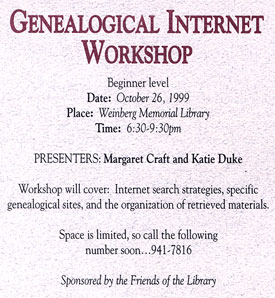Information Update - Fall 1999
Genealogical Research on the Internet: America's Newest Hobby
- If you have "surfed the Internet," now it is time to move on and "crawl the Web," that is to say, the World Wide Web. The Web is an information service providing links between the various computer networks on the Internet. Since its initial conception in 1989, the World Wide Web has continued to grow in number of sites to a total of over 15,768 as of March 1995 (December, John and Neil Randall. The World Wide Web Unleashed. Indianapolis: Sams.net Publishing, 1995, p. 1103)
- Researching one's ancestors is an Internet use, which is rapidly gaining in popularity. When the Church of the Latterday Saints opened a web page (www.familysearch.org/) earlier this year it made international news, and the site was soon so swamped with users that it was nearly impossible for several weeks to log onto it. The posting of early census and tax records and the development of individual web pages devoted to family history have made information available that could previously be found only through extensive travel and research. While we are not experts on genealogical research, we have searched our own ancestors on the Web with surprisingly successful results. Following are a few hints on getting started. The first hint is an obvious but often ignored suggestion, namely, get yourself organized. Not only do you want to decide what you want to know, but you must also decide what you know already. For example, for the ancestor you may want to research, do you know his or her full name? Where did the individual live? To whom was he or she married, and did they have any children? Do you know the approximate dates of his or her birth, marriage, and death Of course, if you knew all about them already you would not be researching them, but you have to have at least some ideas of where to direct your research. And, you also have to be able to distinguish them from other people or families that may have the same name but who are totally unrelated to you.
- A good place to start for 20th century deceased relatives is the Social Security Death Index (www.anccstry.com/ssdi/advanced.htm). This will give you birth dates, death dates, and last place of residence for deceased persons for whom a lump sum death benefit was paid." The next step may be to look at one of the genealogical "megasites" which will direct your research to a more specific site. One of the best of these is Cyndi's List (www.cyndislist.com/), which organizes genealogical sites by subject and by region of the country and the world. For example, if you knew that your ancestors lived in Arkansas in the 19th century you
 could go on Cyndi's List to the section on the United States, choose Arkansas from a state list, and then choose the county which you want to research. Once you get to this level the type and amount of information you find can vary wildly. There is currently a GenWeb Project (wwrv.usgenweb.org/) in which interested individuals adopt counties, set up a web page for the county, and post information and query forums for the county. However, there is no consistency in what you find on the county level. If you are lucky, the person responsible for the county you are interested in has transcribed lengthy and detailed census, tax, land, probate, and marriage records, retyped old county histories with indexes, and set up query forums where you can find others researching your family, all, of course, with a built-in sophisticated search engine. But, this is ideal. Many counties have some of these items or none at all. If you do find a document such as a tax list or census list, it is sometimes advisable to use the 'find in' option under "edit" to look for the name in question. Keep in mind at all times that spellings of names, particularly before 1900, can vary. Also, keep in mind that census records before 1920 that reveal persons' names are not yet available; because of privacy laws the 1930 census is due to be released in the year 2002. For that reason pre-1900 ancestors are in some respect easier to research than more recent individuals. .
could go on Cyndi's List to the section on the United States, choose Arkansas from a state list, and then choose the county which you want to research. Once you get to this level the type and amount of information you find can vary wildly. There is currently a GenWeb Project (wwrv.usgenweb.org/) in which interested individuals adopt counties, set up a web page for the county, and post information and query forums for the county. However, there is no consistency in what you find on the county level. If you are lucky, the person responsible for the county you are interested in has transcribed lengthy and detailed census, tax, land, probate, and marriage records, retyped old county histories with indexes, and set up query forums where you can find others researching your family, all, of course, with a built-in sophisticated search engine. But, this is ideal. Many counties have some of these items or none at all. If you do find a document such as a tax list or census list, it is sometimes advisable to use the 'find in' option under "edit" to look for the name in question. Keep in mind at all times that spellings of names, particularly before 1900, can vary. Also, keep in mind that census records before 1920 that reveal persons' names are not yet available; because of privacy laws the 1930 census is due to be released in the year 2002. For that reason pre-1900 ancestors are in some respect easier to research than more recent individuals. . - Other "megasites" that organize census web sites arc:
Digital Librarian - Genealogy (www.servtech.com/~mvail/genealogy,html). This site will actually direct you to dozens of other more specific sites.
Ancestry.com (www.ancestry.com/main.htm). This site will allow you to search a number of databases, some free, many available by subscription.
Gendex (www.gendex.com). A useful site, but a little confusing to use. It indexes hundreds of genealogical web sites.
Rootsweb Genealogical Data Cooperative (www.rootsweb.com). This site searches databases and links you to family home pages.
Census Online Links (www.census-online.com/links/index.hml). This site links to online census transcriptions. - Another option is simply to go onto a search engine such as AltaVista and search an individual's name. The success of the results can vary enormously. If you are lucky, a relative may have set up a family history home page with detailed and accurate information. However, even fairly uncommon names can results in lots of false hits and dead end leads. And, if you do strike apparent gold, keep in mind all the information you find may not he accurate.
- If you do find an informative site, remember to mark it; retracing genealogical research is a nightmare. It might also he a good idea to print it as well; personal web pages can sometimes disappear or relocate. Also, even if you find nothing, remember the Web is always growing and changing. Check again in a few months.
- Once you have located information you must devise a system for keeping everything organized. To most of us it is a big shock to learn that so much information can be found on ancestors. Not being prepared to keep track of all this new data can result in confusion and chaos. Many of us become discouraged at this point and end up just filing all the paperwork in a box to he brought out again when a child or grandchild becomes interested in family history. To avoid this there are some records that will help you keep all of this in proper perspective. Probably the first record you need to keep is a Pedigree Chart.. There are several examples of Pedigree Charts on the Internet at the following sites:
Ancestry.com Genealogy Charts & Forms
(ancestry.ldsworld.com/download/forms.htm)
Everton's Genealogical Helper Magazine (www.everton.com/charts/freeform.html)
Ancestors Charts and Records (www2.kbyu.byu.edu/ancestors/teachersguide/charts-records.html) - Pick one that you like best and print it out. The Pedigree Chart is a written record of your line of ancestors. Starting with yourself, it then asks for your parents, your parents' parents, etc. Additional information asked for on the chart varies, but most of. the time it asks you to also record birth, death, and burial. Some include date of marriage and place of burial. Pedigree charts vary in how many generations can be listed; pick the one that you think will meet your needs. A tip for first time researchers -- avoid the pretty pedigree charts. Until you have documentation for all of that information and can actually substantiate it, it is subject to change, maybe several times. The best tip that we can pass on to you is to do everything in pencil and have a good eraser handy. The second record that you should keep is a Family Work Sheet or as it is sometimes called a Family Group Sheet. On this record you list not only family information such as the husband and wife, their personal information such as birth, marriage, and death, but also former spouses and the names of parents. Then you prepare a Family Work Sheet for all of those parents. Children are also included on this sheet with their dates of birth, marriage, death, and places where all those events took place, along with their spouse or spouses. The next step is preparing a Family Work Sheet for all those children. The process can become very involved, but eventually you will have an organized history of your family.
- Most people stop with these two records and never think about keeping a personal record of where they obtained the information; this only becomes important to them when they have to find it a second time. If you keep a research log of where that hit. of data came from, it will not be so hard to replicate it a second time.
- Few hobbies generate as much paperwork as genealogy. However, if organized, it will provide you and your family with hours, days, and probably even years, of enjoyment.
Katie Duke

